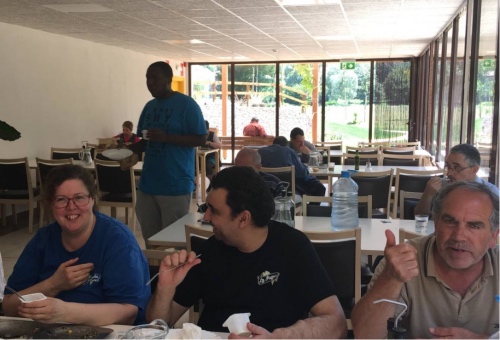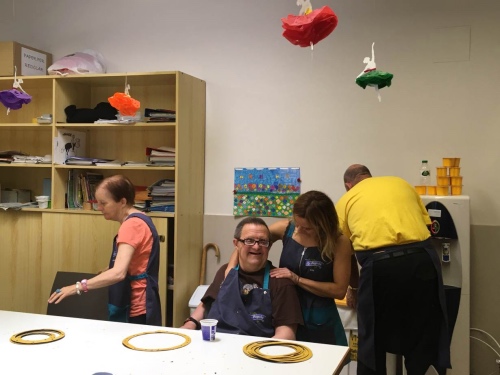
SOPHIE DAVIS, of Thomson Reuters Foundation, reports on how Spanish dairy business La Fageda employs people with mental health conditions, like schizophrenia and bipolar disorder, to help them find purpose in life…
High up in the remote hills of Catalonia, workers carefully stacked crates of yoghurt pots and diligently stuck labels on jars for one of Spain’s most successful – and unusual – dairies, where nearly half the staff have mental health problems.
For decades, La Fageda, meaning The Beech Forest in Catalan, has been employing people with mental health conditions, like schizophrenia and bipolar disorder, to help them find purpose in life and greater emotional stability.

Staff taking lunch at the canteen at the La Fageda dairy business, where nearly half the workforce has mental health problems or intellectual disabilities, in Catalonia, Spain. PICTURE: Sophie Davies/Thomson Reuters Foundation.
“At La Fageda, these people don’t have a label – they are totally integrated – and they start improving, reconstructing themselves without any intervention.”
– Albert Riera, spokesman for La Fageda.
“Normally those with schizophrenia inspire fear – people don’t know how they are going to act,” said Albert Riera, a spokesman for the pioneering social business, some 120 kilometres north-east of Barcelona.
“At La Fageda, these people don’t have a label – they are totally integrated – and they start improving, reconstructing themselves without any intervention.”
Finding and holding on to paid work is often a challenge for people with mental health problems because of stigma and misunderstanding of the recovery process, according to the World Heath Organization.
But psychiatric studies show that even low paid, part-time work can reduce hospital re-admissions and their need for healthcare services.
Nearly 130 people with mental health issues work at La Fageda, mixing on a daily basis with about 160 other employees that do not.
While people with mental health conditions can struggle to maintain healthy routines and stay away from drugs, working at La Fageda motivates them to get up early, focus on recovery and improves emotional balance, said Mr Riera.
“Our attitude is: you are not ill, you have an illness like I have a pain in my ligament – it’s the same,” he told the Thomson Reuters Foundation.
“You are responsible for your work, and you have to do it well, and then you will receive a wage…That they can see the yoghurts they have made in the supermarket – and that people pay for them – gives them great pride.”
Staff with mental health issues take a bus each day from shared accommodation in the nearby town of Olot down a long, winding path through the forest to the farm, nestled among the verdant hills and ancient volcanoes of La Garrotxa region.
A team of therapists is based permanently on site and staff can also use an outdoor gym, generous spaces devoted to exercise and relaxation, and take part in creative activities.

Former staff members of La Fageda dairy business in Catalonia, Spain, take part in a creative workshop with an art therapist, on 20th June. PICTURE: Sophie Davies/Thomson Reuters Foundation.
“Working in nature, working with living beings, animals and plants, is an essential part of the La Fageda project. The environment is part of the therapy.”
– Cristobal Colon, founder of La Fageda.
Joan Vila Marco, who has been working at La Fageda for nearly two decades, was keen to talk about his art.
“Did you see my pictures?” he asked urgently, as he piled up his plate in the staff canteen. “I like to draw.”
The 56-year-old was diagnosed with schizophrenia while studying at university in Barcelona. His condition deteriorated and he eventually had to drop out.
His parents – who were desperate, not knowing what to do with him – were relieved when they found La Fageda, said Riera.
Now Mr Marco teaches art in workshops at the farm and his drawings hang in its offices, an obvious source of pride to him.
Even the farm’s outhouses, looking out over the snowy peaks of the Pyrenees, embody serenity. Baroque chamber music wafted from the barns as a cow rubbed itself against a giant massage brush – both used to calm the livestock down.
“Working in nature, working with living beings, animals and plants, is an essential part of the La Fageda project,” said Cristobal Colon, who founded La Fageda on a shoestring in 1982 as a cooperative.
“The environment is part of the therapy.”
Mr Colon set up La Fageda to give people with mental health conditions the chance to work, draw a wage and recoup some self-esteem after being horrified by the treatment of patients in mental health hospitals where he worked. In the early days, he rode through the forest on horseback to the farm, where its workers – who have always come from the local area – planted and harvested trees.
After a decade, the cooperative began to produce milk, then later what the brand is now most famous for – creamy, organic yoghurts. Today, La Fageda also sells other products including jams and desserts.
But Mr Colon, 69, is busy preparing for his retirement and for La Fageda’s future without his leadership.
The utopian project ceased to be a cooperative in 2015 and took on the status of a foundation, enabling it to receive loans and make important investment decisions more easily, Mr Riera said.
Although workers are now classed as employees, rather than members, La Fageda’s ethos has not changed, he said.
“The company has a culture that offers people transcendence,” he said.





